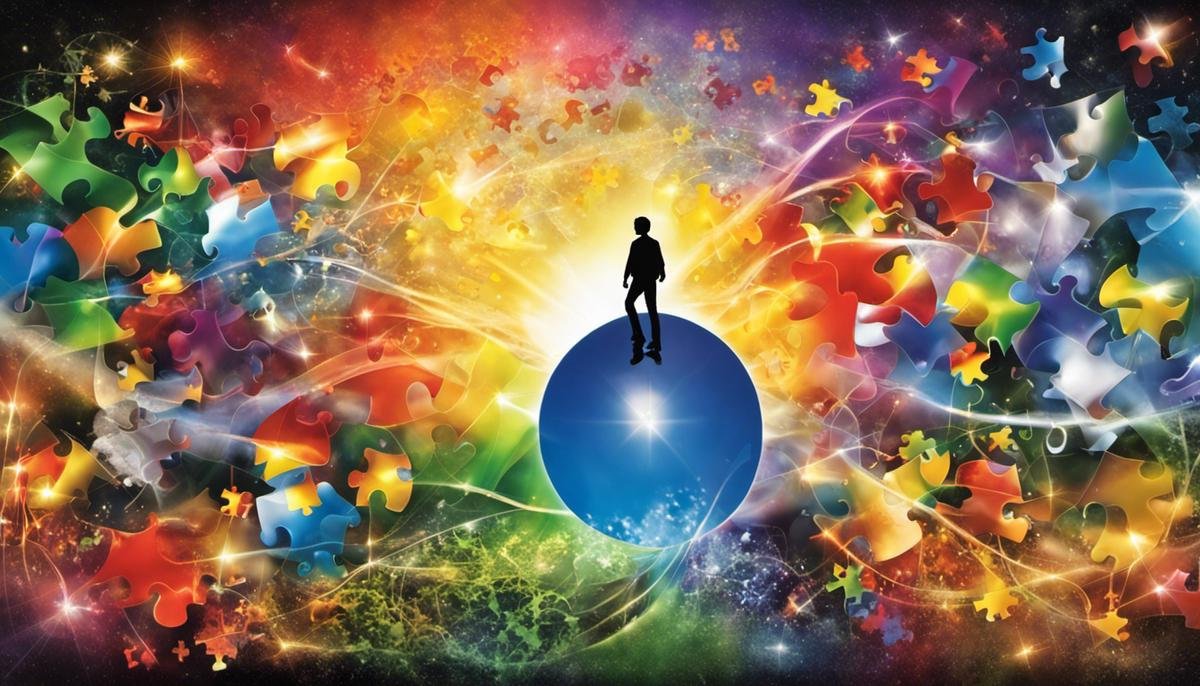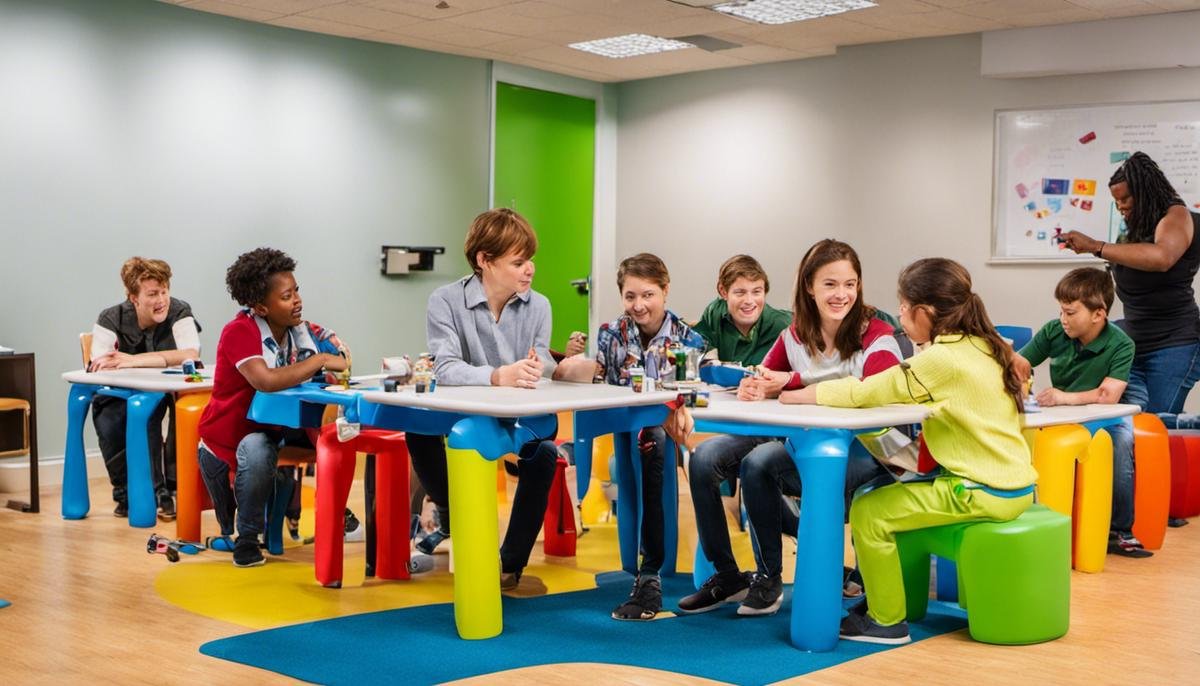
Acquiring proficiency in social interactions, recognizing emotions, and developing empathy is an inherent facet of human development. However, for individuals with Autism Spectrum Disorder (ASD), these skills do not come naturally, often creating barriers to their social engagements. Our endeavor through this discourse is to foster understanding about Autism, highlighting the pivotal role played by social skills in enhancing the quality of life of those afflicted. It is imperative to evaluate the diverse training algorithms available for social skills enhancement in individuals with Autism, their benefits, and their shortcomings, thereby illuminating the path towards promising future prospects in this domain.
Understanding Autism Spectrum Disorder
Autism Spectrum Disorder, or ASD as it is commonly abbreviated, is referred to as a ‘spectrum’ because it is characterized by a wide range of signs and symptoms. Undeniably, it is the ramifications of this disorder on social interactions that present the most considerable challenges for individuals with ASD. With an understanding of the unique attributes of ASD shaping these social difficulties, these challenges can be better addressed and mitigated.
The most prominent issue is the difficulty in understanding and interpreting non-verbal communication cues. Individuals with ASD often find it hard to decipher facial expressions, tone of voice, body language, and gestures. Consequently, it may be challenging for them to comprehend the emotions and needs of others.
Another notable attribute of ASD is the high degree of preference for routine and structure. These individuals derive comfort and control from predictability, with changes to routine or unfamiliar situations often instigating anxiety and confusion. This need for predictability can make social interactions, which are inherently unpredictable and dynamic, particularly challenging.
Similarly, hypersensitivity to sensory stimuli, which is significantly common in individuals with ASD, also impacts their social interactions. This hypersensitivity can manifest as intolerance or hyper-awareness to loud noises, bright lights, or crowded spaces, which are frequent components of social environments. These uncomfortable experiences can lead to avoidance behaviors, further impeding opportunities for social engagement.
Individuals with ASD may encounter difficulties with initiating and maintaining conversation. Their interests can often be obsessional and highly focused, which can limit the scope of conversational topics and deter reciprocal interactions.
Another key aspect is impaired theory of mind. Theory of mind refers to the ability to appreciate that others have perspectives, thoughts, and beliefs different from one’s own. Deficits in this domain can result in challenges in understanding others’ points of view, predicting behavior, or understanding the intent behind actions and words.
It is also paramount to note that while these traits are common in individuals with ASD, they do not universally apply. The spectrum’s breadth dictates that each individual’s presentation will be unique, and their struggles with social interaction will vary as the disorder is a constellation of symptoms and not a single entity.
Ultimately, this understanding profiles the difficulties encountered by individuals with ASD in social interactions. However, it should not only function as a guide but as a pointer towards patience, empathy, and efforts to facilitate more inclusive, accessible social environments for those living with ASD.

The Importance of Social Skills in Autism
Title: The Imperative of Social Skill Development in Individuals with Autism Spectrum Disorder
There is an intricate interplay in the human experience where social capabilities often mark the difference between success and marginalization, profoundly influencing the quality of life. In the context of individuals with Autism Spectrum Disorder (ASD), where impairing hurdles exist in human connection, the development of social skills becomes particularly critical.
Social competence is not merely an abstract entity; it possesses palpable value. Its maturation, particularly in individuals with ASD, serves as a pivotal skill, enhancing their ability to engage in meaningful relationships, communicate effectively, and actively participate in the broader social world. But more than that, it assists in nurturing self-confidence, boosting self-esteem, and fostering self-sufficiency.
The inability to master social skills could significantly limit an individual’s capacity to function independently. The domains of education and employment, for instance, necessitate social dexterity – from understanding instructions, collaborating with peers, to interpreting social cues in the workplace. Hence, the development of adaptive social skills in individuals with ASD is integral to achieving autonomy and independence, ensuring successful transitions across life stages.
On the flip side, an underdeveloped social aptitude may inadvertently contribute to social isolation. In the absence of nuanced understanding and proper training, the world may become an overwhelming place for individuals with ASD. Without means to effectively navigate their social environment, they may retreat into their shell, leading to isolation and exacerbating feelings of loneliness, frustration, and anxiety.
Moreover, social skill development plays a critical role in mitigating challenging behaviors rooted in the inability to communicate needs and wants effectively. A focus on teaching social interaction and communication skills can increase opportunities for positive social encounters and decrease instances of adverse behavior.
Furthermore, social cognitive skills, such as perspective-taking and empathy, lie at the heart of social interaction. Emphasizing their cultivation may directly contribute to reducing misunderstandings and enhancing social engagement, fostering healthier and more meaningful connections.
Finally, social skill development aids in diffusing the stigma associated with ASD, fostering a more inclusive society. By fostering the abilities to adequately interact within a variety of social contexts, individuals with ASD can project a more representative image of their capabilities with greater confidence, challenging misconceptions and stigmas directed against them.
Thus, the development of social skills in individuals with ASD represents far more than a therapeutic intervention. It is a means to enable the human right to social interaction and connection, which impacts every domain of life. It is a primary vehicle for growth and self-expression, ultimately permitting individuals to articulate their inner selves, fostering understanding and acceptance across communities. Evidently, for individuals with ASD, this development takes on a role of amplified significance, underscoring the need for continued research, method development, and interventions tailored toward this end.

Existing Social Skills Training Methods for Autism
Given the aforementioned understanding of Autism Spectrum Disorder (ASD) and the importance of social competence, one delves into the proven effective training methods to enhance the individuals’ social skills. This knowledge is paramount as it supports the creation of interventions targeting real-world social challenges, ultimately promoting the overall quality of life of individuals with ASD.
Peer-mediated interventions have surfaced as a robust method with a mounting body of evidence backing their efficacy. In this approach, neurotypical children are trained to facilitate social interactions with ASD peers. The link to real-world application is explicit, as peers represent a natural social environment. Systematically promoting opportunities for social exchange between ASD individuals and their peers can significantly ameliorate social engagement, social-communication skills, and lead to more positive peer relationships.
Parent-implemented interventions have equally been shown to wield remarkable results. When caregivers are trained to adopt specialized teaching strategies, interventions can be implemented in natural, everyday contexts. Parents receive instructions and coaching for promoting social communication skills in a comprehensive range of activities and routines. The approach leverages the long hours these individuals spend with their caregivers, and the fact that caregivers usually have the most profound understanding of the child’s abilities and preferences.
Role-play and Social Script Training is another promising avenue. This method utilizes condition-specific designed scripts narrating social situations, which the individuals rehearse and then apply in real-world interactions. Scripts can cover a wide gamut of social circumstances, from basic greetings to handling complicated social situations. Practicing these scripts imbues the participants with an increased level of comfort and competency in social interactions.
The method of Video Modeling presents a surprisingly potent tool in teaching social skills. Here, individuals with ASD are shown videos of desired socially efficient behaviors, followed by guided real-life enactment of the same behavior. Aided by the powerful visual learning abilities witnessed in many ASD individuals, they attain an understanding of complex social behaviors progressively.
Social Skills Training Groups, spearheaded by professionals, offer a more formal learning environment. The training typically includes elements of instruction, role-play, and feedback and often integrates parent training and homework assignments. The group setting can be highly advantageous, providing essential opportunities to practice skills with peers, and amplifying individuals’ sense of belonging.
Finally, we venture into the promising utilitarian world of technology. Virtual reality and computer-based interventions have made significant strides in helping individuals with ASD develop social skills. The safe and controlled virtual environment enables the practice and refinement of complex social scenarios. The technology comes in a variety of formats, from online gaming to software applications, opening avenues for uniquely tailored approaches.
Each mentioned method is a testament that individuals with ASD can significantly enhance their social skills leading to a better quality of life. A multidimensional approach encompassing diverse teaching strategies adapted to the individual’s needs, strengths, and preferences, is the accepted best practice. The journey to discover innovative, effective, and empathetic strategies to assist individuals with autism navigate the social landscape is a challenging, yet deeply rewarding pursuit.

Case Studies and Real-World Scenarios
Social skills training methods have evolved significantly over time. One of these methods, Peer-mediated interventions, entail actively involving typically developing peers in social interaction with those with Autism Spectrum Disorder (ASD). Peer-mediated interventions have proven fruitful in the form of reciprocal interactions, heightened social engagement, and the fostering of genuine friendships for individuals with ASD. One particular series of studies noted that children with ASD communicated more often with their peers during recess when trained peers were present. This concrete example demonstrates the real-world application and positive outcomes observed.
In addition to this, Parent-implemented interventions have also proven beneficial. These are a type of social skills training where parents, as the primary agents of change, promote social competence in their children. Practical demonstrations of its success abound – some children with ASD, after receiving parent-implemented interventions, exhibited increased joint attention initiations which are key in forging social connections.
Furthermore, Role-play and social script training methods have also consistently manifested noticeable improvements in social competencies. By repeatedly rehearsing specific social scenarios, individuals with ASD enhanced their ability to negotiate, compromise, make decisions, solve problems socially, and properly engage in sharing and turns-taking. Observations validate role-play and social script trainings as the skills acquired in practice settings often generalize into everyday social situations.
Video modeling, another vital method for social skills training, involves the learner watching recordings which demonstrate appropriate social behavior and then attempting to emulate what they have viewed. Throughout studies, users of video modeling have demonstrated diversified social initiations and higher rates of appropriate toy play.
Moreover, Social skills training groups offer a safe space for individuals with ASD to learn and practice social skills among each other. Following these group sessions, marked improvements have been observed in participant’s abilities to interpret social signals and adopt a proactive rather than a reactive approach in social scenarios.
Finally, harnessing the potential of modern technology for social skills training has grown in popularity. Such Technology-based interventions (virtual reality and computer-based) have been utilized to improve the social interactions of those with ASD. These interventions have not only proven engaging for participants but have also consistently led to improvements in areas such as emotion recognition and understanding social norms and rules.
In conclusion, it’s clear that social skills training methods have been applied effectively in a variety of real-life cases, and positive outcomes have been observed across the spectrum. While these methods are not without their challenges, the systematic study and findings present a promising trajectory for continued advancements in social skills training for individuals with ASD. The resilient pursuit of knowledge and research in this area continues to affirm the undeniable potential of adaptive and inclusive scientific and educational landscapes.

The Future of Social Skills Training for Autism
The Future of Social Skills Training for Individuals with Autism: Next Steps in Research and Practice
Autism Spectrum Disorder (ASD) is characterized by a constellation of symptoms with profound individual variability, which presents unique challenges in the provision of social skills training. This tremendous heterogeneity necessitates the development of flexible, adaptable, and personalized social skills interventions that not merely acknowledge but harness this diversity for optimal outcomes. The outlook for future interventions necessitates a careful interplay between universally applicable core tactics and individual-specific adjustments with a deeply entrenched umbrella approach.
In the quest for honing social skills among individuals with ASD, advancements in cognitive neuroscience will likely revolutionize intervention strategies and methodologies. Innovative concepts such as neuroplasticity, the brain’s ability to rewire itself in response to learning, offer substantial promise. Novel interventions incorporating neuroplasticity principles can yield substantial improvements in social skills outcomes. The brain’s remarkable flexibility indicates a potential for effectuating profound changes in social cognitive skills, even in mature stages of development.
Technological advancements, too, are set to redefine social skills training landscapes. The increasing integration of artificial intelligence (AI) and machine learning into therapeutic approaches may emerge as powerful tools for augmenting traditional instruction. Such technological infusions can provide immersive, constructive, and customizable training environments, dynamically adapting according to the individual’s progression and responses. Furthermore, advancements in virtual and augmented reality have exciting potentials for experiential, real-time social skills training, mitigating the often stark transition between practice and application.
Recent groundbreaking research in the realm of genetics and genomics foretells a potential for unveiling novel intervention targets. Uncovering the genetic underpinnings of ASD could illuminate the interplay between genetics and socio-communication ineptitudes, facilitating targeted gene therapy in the long run.
Simultaneously, there is a predicted rise in the prominence of eco-social approaches in intervention designs. Recognizing the crucial role of environmental factors and social contexts, these approaches seek to catalyze improvements in social ability not merely within the individual, but also within their social world. Fostering socially enriched environments and educating significant others about interacting effectively with individuals bearing ASD will become increasingly prioritized.
Moreover, the feasibility of developing preventative interventions is also gaining attention. Early interventions focused on children exhibiting early signs of ASD, even before a formal diagnosis, are proving beneficial. Continued exploration of such early detection and intervention offers a potential pathway to prevent or lessen social difficulties associated with ASD significantly.
To harness these advances effectively and ethically, there is a clear mandate for robust scientific research conducted hand-in-hand with transparent ethical considerations. Policymakers, researchers, health professionals, and society at large need to stay united in facilitating optimal conditions for the effective deployment of these future interventions.
While unlocking the potential of these transformative interventions requires persistent research effort, dedication, and patience, the opportunities on the horizon bear an unequivocal promise – a future where individuals with ASD can navigate their social world with greater confidence, inclusion, and competence. The journey towards this promising future for social skills training for individuals with ASD, though fraught with complexities, is advantageous not merely for those with ASD, but for society as a more inclusive, empathetic, and understanding whole.

Grounded in the core belief of enabling individuals with Autism to lead fulfilling social lives, our exploration of varied social skills training methods puts forth an enriching array of possibilities. As we delve deeper into real-life testimonials and professional observations, the transformative power of such training becomes clear. Although challenges persist, anticipation of technologically advanced therapeutic interventions, innovative treatment tactics, and holistic approaches are driving the future of Autism care and treatment. The potential and impending advancements, unfolded through this discourse, serve to instill hope and optimism not just within the Autism community, but also among researchers, caregivers, and society at large.





